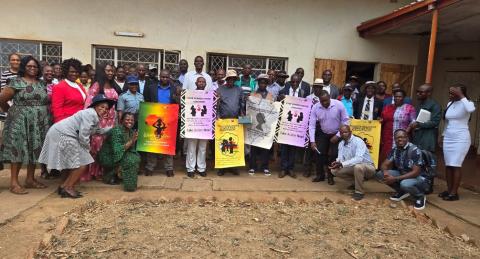
OFFICIAL PRESS RELEASE
ARC, in collaboration with the Government of Zimbabwe, meet with traditional leaders in Dotito, Mount Darwin to assess progress made in gender mainstreaming in DRM
This week, as part of a follow-up mission on the ARC Gender Action Plan for Disaster Risk Management (DRM) in Mount Darwin, Mashonaland West, Zimbabwe, the ARC collaborated with various government ministries to engage with traditional and religious leaders in the district. This meeting builds on the gender mainstreaming in DRM efforts initiated in Zimbabwe in 2021, which specifically targeted Mount Darwin and resulted in the creation of a tailored Gender Action Plan for the region.
“This mission is an integral part of the implementation of the ARC gender strategy, which emphasises advocacy and outreach activities within communities,” said Boroto Ntakobajira, ARC’s Gender Specialist. “It underscores the critical importance of integrating gender considerations into DRM at the grassroots level and fosters dialogue both at the community and policy levels,” he continued.
Mount Darwin serves as a pilot area for this ARC programme, making this meeting crucial for evaluating the progress achieved thus far. This district was selected as one of the initial sites for gender analysis in DRM when the ARC, in partnership with the Government of Zimbabwe, launched the gender mainstreaming initiative in DRM in 2021. Engaging traditional and religious leaders in this discussion was essential to gather their perspectives on progress made toward gender equality across all facets of life, particularly in the context of natural disasters.
Upon entering Mount Darwin, the team was warmly welcomed by the Provincial Government, where the team received formal approval to proceed with their work from the Minister of State, Provincial Affairs and Devolution. “This endorsement from the government, coupled with the presence of the five local chiefs and other key stakeholders, underscores the Government of Zimbabwe's commitment to integrating gender considerations in DRM,” said Hussein Madih, ARC’s Country Engagement Manager looking after Zimbabwe.
The District Development Coordinator (DDC), White Nkoma, and Provincial Development Officer, Judith Hove, accompanied the team on this important mission, giving it the legitimacy it deserves at a local level.
“Zimbabwe remains at the forefront of gender mainstreaming in DRM, largely due to the government's dedication to inclusivity. This commitment ensures that no individual is marginalised in efforts to enhance preparedness to respond to weather-induced disasters and disease outbreaks,” said Christaina George, ARC’s Head of Gender Unit.
As climate change increasingly disrupts communities across Africa, Zimbabwe's initiatives not only bolster resilience-building efforts but also empower all members of the community, fostering a more equitable approach to disaster preparedness and response.
During the session, the chiefs underscored their commitment to transforming mindsets regarding gender issues and expressed optimism about the progress being made. They pledged to persist in advancing this agenda, aligning their efforts with the urgent call to action from the highest levels of government.
The session concluded with presentations from various government entities accompanying the ARC delegation in Mount Darwin. Each Ministry highlighted its specific workstreams and the efforts to champion gender mainstreaming across all government departments in Zimbabwe. Notably, the Government of Zimbabwe has appointed Gender Directors in each ministry, underscoring its commitment to addressing gender issues.
“The meeting enabled us to interface with traditional leaders, religious leaders and community members to explore mainstreaming gender in DRM, highlighting the gender gaps in disaster response and action planning and the need to ensure that men and women are actively involved in the disaster preparedness and response plans,” said Oscar Manyepwa, District Development Officer for the Ministry of Women Affairs.
The afternoon session convened members of the communities around Dotito, gathered under a musasa tree to have an open dialogue on issues pertaining to gender mainstreaming in DRM in their district.
“This gathering reflects the African tradition of addressing communal issues under a baobab tree, fostering resolution and collective understanding. These discussions have revealed significant progress among community members in grasping the concepts and importance of gender mainstreaming in DRM,” said Commissioner Naome Chimbetete, a consultant on ARC’s gender work in Zimbabwe.





